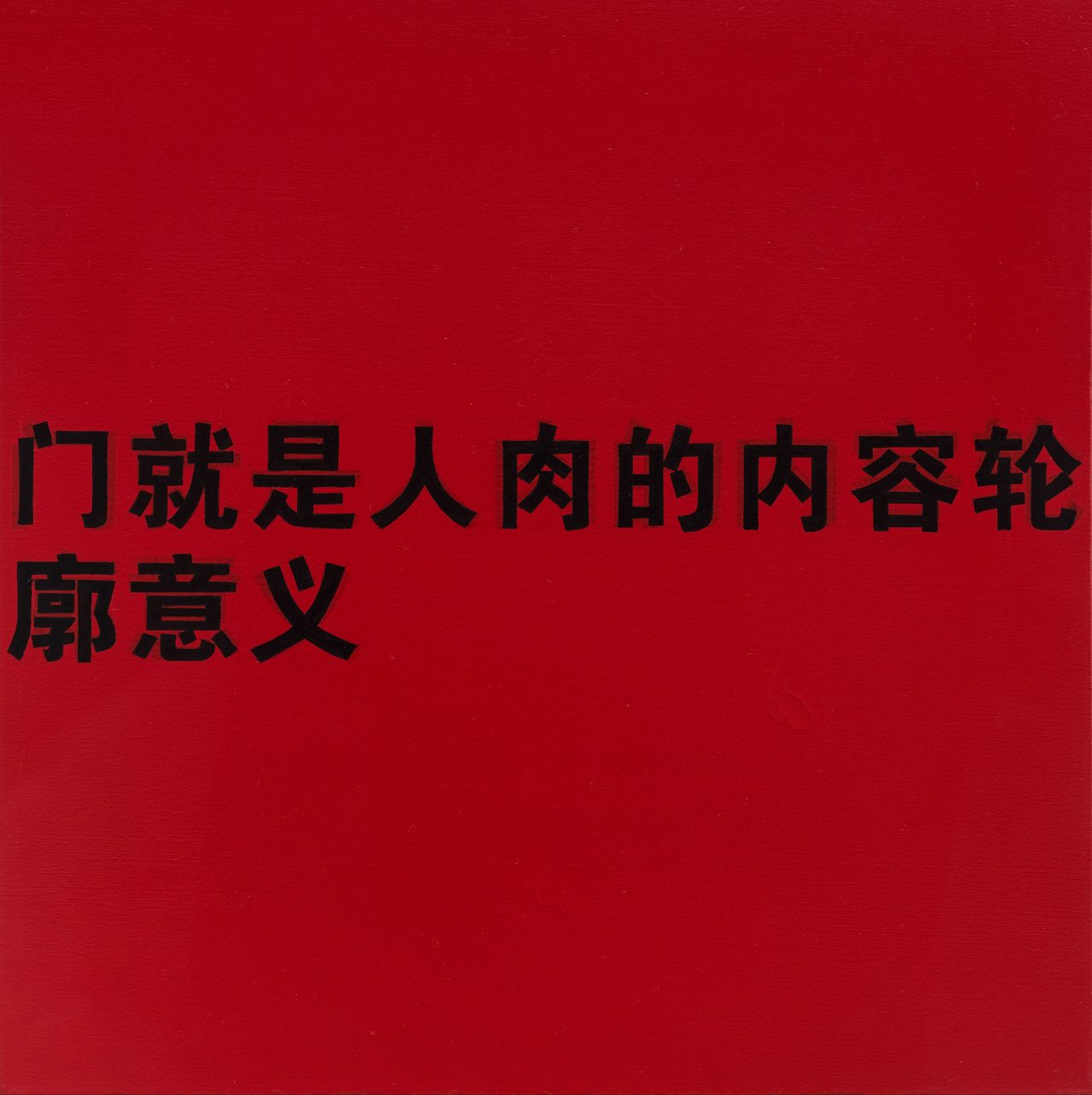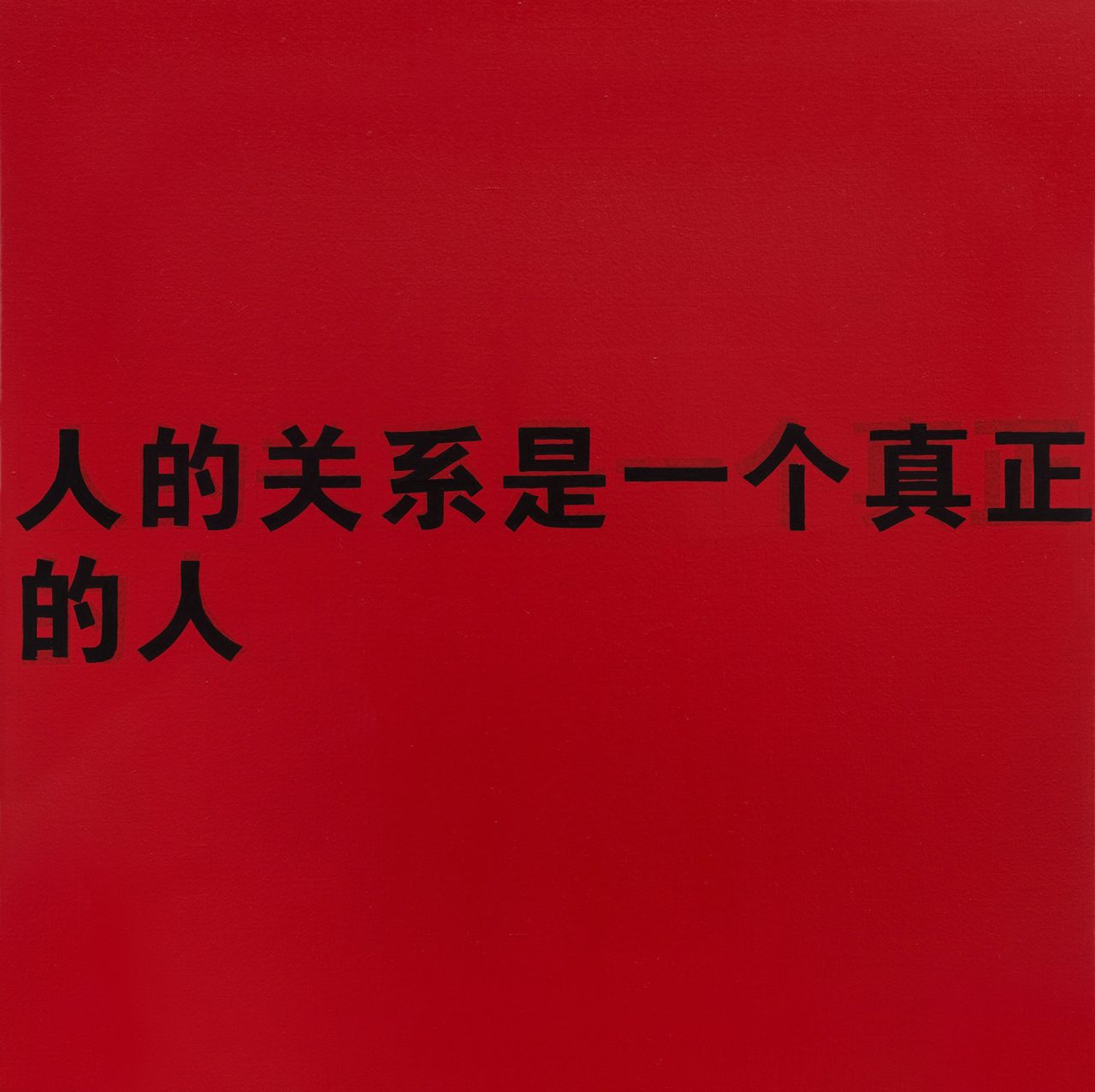Wu Shanzhuan:
“Deficit Character” & “Silent Ocean” (III)
Duration: 17 JUNE 12:00 AM
- 16 JULY 11:59 AM (CST), 2023

"I believe art is a silent ocean ... It is a static, formless, empty box—it must accept absolutely anything from absolutely anyone, and it is destined never to be full. Its strength is in nothingness ..." Because Wu Shanzhuan uses this concept of the "box", it is plausible to suppose that when he speaks of art is he referring precisely to the original square-character format of the deficit character. These deficit characters appear in the "sea of words", laden with messages; forming a man-made, Bermuda-triangle-like blind spot. Since they have as their legacy the special qualities of the simplified character epoch, and the authoritative coloration of boldface character type, their very impermeability makes a strong satirical statement. And the very similarity between deficit characters and "meaning-ful" words produces an even more important inference: the deficit character becomes the basic metaphor for art.
Wu unveils this simple fact: Every word which we think carries a specific meaning is in fact a deficit (red) character! The division of words into various categories of meaning is simply the result of a set of systems, and of the authorative power that upholds them. And it is also the result of our being forced to comply with a kind of violence about which we were never consulted. This kind of indisputable force is just like that of a person with a red armband who comes to notify us, or like a high-pitched megaphone that announces: "Today No Water" (or, literally, "stoppage of water supply this afternoon").
What the deficit (red) character tells us is that, following the rules of deficiting, every word contained in the statement "Today No Water" can be used to such excess of exploitation that finally its original nature as a deficit character exposed. For example, let's for experiment's sake try some simple forms of "Userism": stare at a word for ten minutes, or add brackets to a certain word, etc. The simple deficiting of the deficit character "on the surface seems so profound, that one is easily fooled by it"; while the deficiting of the statement "stoppage of water supply this afternoon" on the surface seems "something only to be expected, and because of this is easily misunderstood".
In big character posters, banners and grand signboards, where words are meant to speak with authority, the boldface-type simplifhed characters are printed in red. Every single word is clearly delineated and appropriately aligned. They, like the commodities in supermarkets, await consumption in an orderly fashion.
When Wu Shanzhuan left his country town of Dinghai in 1991, simplified character banners and posters were everywhere. But he brought along his deficit (red) character to Europe, where supermarkets are everywhere.
-Excerpted from Qiu Zhijie's Wu's Question or the Questioning of Wu.
About Wu Shanzhuan
Wu Shanzhuan (b. 1960, China). One of the key figures of the '85 New Wave Art Movement in China, Wu Shanzhuan's practice defies use of conventional visual art terms such as "watch", "stare" and "experience" to engage with. Instead, pulling together street smartness, intellectual experimentation and the spirit of the absurd in contemporary art, Wu Shanzhuan and his collaborator Inga Svala Thorsdottir draw you into a world where "read" becomes the key term. They are not creators of visual spectacles, but rather overthrowers and discoverers of truths and propositions, as well as counterfeiters of ideology and interpreters of everyday theology.
Wu Shanzhuan defines himself as criminal, intermediary, tourist and labor. The works Wu Shanzhuan creates are not the granted artworks but rather "Wu's Things". From the large number of "Wu's Things" made in the early 1990s, we see a desire for full opening and "transcending the boundaries" and his obsession with mathematics and logic which brings a strange sense of truth to his works. For a society dictated by a variety of faiths and customs, this is an "adulterated" truth. Wu never tires of quoting from Sartre: "People are a bundle of useless passion". The use for his useless passion is to find "useless truths". For more than 20 years, Wu Shanzhuan has used the forumulas "pseudo-words", "thing's right(s)", "parthenogenesis", "secondhand water", "tourist information", "perfect bracket" and "bird before peace", all of which are "useless truths", to weave his personal ideology. This ideology constitutes a profound critique to the system of concepts and experiences that we are accustomed to.
In the era when conceptual art generally faces a rethink, the works attest a vibrancy of concept and the power of thoughts. It is a rich collection of intriguing humor and sharp wit, spontaneous anti-metaphysical actions, insights into everyday politics, sensitivity to invisible workings of power systems and adherence to the fundamental state of democracy.
Wu Shanzhuan:
Deficit Character & Silent Ocean (III)
Duration: 17 JUNE 12:00 AM
- 16 JULY 11:59 AM (CST), 2023

"I believe art is a silent ocean ... It is a static, formless, empty box—it must accept absolutely anything from absolutely anyone, and it is destined never to be full. Its strength is in nothingness ..." Because Wu Shanzhuan uses this concept of the "box", it is plausible to suppose that when he speaks of art is he referring precisely to the original square-character format of the deficit character. These deficit characters appear in the "sea of words", laden with messages; forming a man-made, Bermuda-triangle-like blind spot. Since they have as their legacy the special qualities of the simplified character epoch, and the authoritative coloration of boldface character type, their very impermeability makes a strong satirical statement. And the very similarity between deficit characters and "meaning-ful" words produces an even more important inference: the deficit character becomes the basic metaphor for art.
Wu unveils this simple fact: Every word which we think carries a specific meaning is in fact a deficit (red) character! The division of words into various categories of meaning is simply the result of a set of systems, and of the authorative power that upholds them. And it is also the result of our being forced to comply with a kind of violence about which we were never consulted. This kind of indisputable force is just like that of a person with a red armband who comes to notify us, or like a high-pitched megaphone that announces: "Today No Water" (or, literally, "stoppage of water supply this afternoon").
What the deficit (red) character tells us is that, following the rules of deficiting, every word contained in the statement "Today No Water" can be used to such excess of exploitation that finally its original nature as a deficit character exposed. For example, let's for experiment's sake try some simple forms of "Userism": stare at a word for ten minutes, or add brackets to a certain word, etc. The simple deficiting of the deficit character "on the surface seems so profound, that one is easily fooled by it"; while the deficiting of the statement "stoppage of water supply this afternoon" on the surface seems "something only to be expected, and because of this is easily misunderstood".
In big character posters, banners and grand signboards, where words are meant to speak with authority, the boldface-type simplifhed characters are printed in red. Every single word is clearly delineated and appropriately aligned. They, like the commodities in supermarkets, await consumption in an orderly fashion.
When Wu Shanzhuan left his country town of Dinghai in 1991, simplified character banners and posters were everywhere. But he brought along his deficit (red) character to Europe, where supermarkets are everywhere.
-Excerpted from Qiu Zhijie's Wu's Question or the Questioning of Wu.
About Wu Shanzhuan
Wu Shanzhuan (b. 1960, China). One of the key figures of the '85 New Wave Art Movement in China, Wu Shanzhuan's practice defies use of conventional visual art terms such as "watch", "stare" and "experience" to engage with. Instead, pulling together street smartness, intellectual experimentation and the spirit of the absurd in contemporary art, Wu Shanzhuan and his collaborator Inga Svala Thorsdottir draw you into a world where "read" becomes the key term. They are not creators of visual spectacles, but rather overthrowers and discoverers of truths and propositions, as well as counterfeiters of ideology and interpreters of everyday theology.
Wu Shanzhuan defines himself as criminal, intermediary, tourist and labor. The works Wu Shanzhuan creates are not the granted artworks but rather "Wu's Things". From the large number of "Wu's Things" made in the early 1990s, we see a desire for full opening and "transcending the boundaries" and his obsession with mathematics and logic which brings a strange sense of truth to his works. For a society dictated by a variety of faiths and customs, this is an "adulterated" truth. Wu never tires of quoting from Sartre: "People are a bundle of useless passion". The use for his useless passion is to find "useless truths". For more than 20 years, Wu Shanzhuan has used the forumulas "pseudo-words", "thing's right(s)", "parthenogenesis", "secondhand water", "tourist information", "perfect bracket" and "bird before peace", all of which are "useless truths", to weave his personal ideology. This ideology constitutes a profound critique to the system of concepts and experiences that we are accustomed to.
In the era when conceptual art generally faces a rethink, the works attest a vibrancy of concept and the power of thoughts. It is a rich collection of intriguing humor and sharp wit, spontaneous anti-metaphysical actions, insights into everyday politics, sensitivity to invisible workings of power systems and adherence to the fundamental state of democracy.



